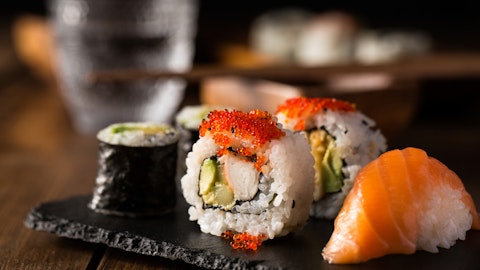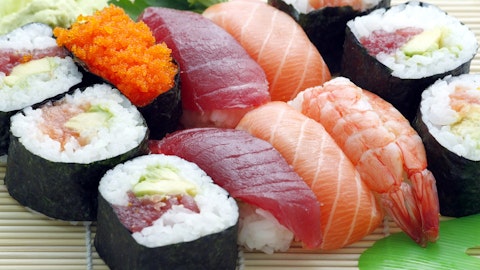Jeff Uttz: The first thing to remember is that, our Q1 is our — seasonality-wise is our lowest performing quarter from a margin perspective. So as we go throughout the year, we do expect margins to improve. I do not see much more downward pressure on margins. I really don’t. I feel like we’ve reached the peak or getting — nearing the peak, both in terms of wage and cost of goods sold. I mean if you really look at the numbers, it was really all COGS this quarter, really that impacted our bottom line and our margins. So if we can get or what control we have, and I think we have some control, but a lot of it’s out of our control of the macro environment. Once inflation comes down or inflation eases, I really think that our margins are going to see some improvement. And when that’s going to happen, I can’t say, but I really feel like maybe the worst is behind us as it relates to that.
Sharon Zackfia: Okay. And then I’m sorry if I missed this, but I don’t think I heard any update on loyalty and the membership trends there. And I’m just curious, as you’re continuing to generate the positive traffic, are you having continued success converting folks to loyalty? And is there any update on frequency of loyalty versus non-loyalty?
Benjamin Porten: Yes. So the number — the loyalty — the rewards membership growth rate has pretty much been in line with the exceptional rate that we’ve been seeing over the last year or two. We’re really pleased with that. In terms of the rewards program, the bigger news is really the fact that we’re able to begin testing with Punch in this quarter. Up until now, we’ve used an in-house platform, and it’s been very useful in terms of driving frequency and increased check spend. But in terms of data leveraging or targeted marketing, we haven’t been able to use it. And so being able to switch to that, it’s really kind of a paradigm shift in our rewards program and our marketing strategy. And so that’s something that we’re — that’s going to be the big news for rewards this year.
Sharon Zackfia: Okay. Thank you.
Operator: Our next question comes from the line of Joshua Long with Stephens. Please proceed with your questions.
Joshua Long: Hi. Thank you for taking the question. I was hoping we could dig into some of the either initiative platforms, tools and just your overall approach in terms of going after that first-time guest and getting them into the funnel. It seems like that’s a big opportunity. You talked about it a couple of times. I imagine that there is either some tools, marketing or some sort of approach that you’re bringing. And without giving it away too much, I’m just curious if you could talk about it high level and how you’re thinking about that unfolding as we go forward.
Jimmy Uba: In terms of our targeted marketing, just at a very high level, it’s going to be heavily focused on search engine optimization. So whether it’s Google or Yelp, we’ll be able to drive that many more guests who are interested in Japanese or sushi. We’ll be top of mind because we’ll be at the top of the list, and so that’s something that we’re excited for. The incremental spend that we spend on targeted marketing is not going to really result in a change in the overall marketing budget. It’s going to be more — we’re optimizing — we’re always optimizing our marketing efforts, and we’ll be able to reallocate some of those savings towards that targeted marketing, which goes very far in terms of the effectiveness on a dollar basis, and so that would be a high level.
And then with the rewards program platform, Punch, we’re really going to be able to slice and dice our consumers in a way that we just have never been able to do that before. So for instance, if there are guests that are — we know that they eat noodles every time, then we can send them a noodle coupon for half off at, say, 4 p.m., which is historically a shoulder period for us. People ask us, “You’ve got incredible wait times. How are you going to be able to drive comps in these tremendous over performing stores?” And this is one of those opportunities. It’s going to be harder to get somebody get additional parties in the door during 8:00, but that’s certainly not the case in 4:00. And so that’s one of the other big things that we’re excited about.
Joshua Long: Very helpful. Thank you for that. Maybe coming back to the inflation topic from a slightly different angle. I kind of appreciate the current environment, and I know that we’ve — you’ve got an entire team. And just relatively new to the role here, but one of the things we had talked about was just maybe some supply chain optimization or just opportunities there. And I was curious if you could, again, high level, talk about any sort of initiatives you’re working on there, leveraging the core brand strength and the broad basket you have. But also maybe any sort of near-term wins or opportunities around where there’s room to optimize or maybe drive some efficiency over time as you just get things in line to help scale the brand?
Jeff Uttz: One of the things that I really want to look at is getting more of our basket into a broad liner. I think that, that will really help us. I think there’s some opportunity there. One of the things that we’ve had trouble with over the last year was having to buy some of our fish that we buy from suppliers that were not our regular suppliers. And because during the pandemic, some of our regular suppliers had to throw out a lot, and they weren’t able to fulfill some of the orders that we needed. So we had to go to these smaller houses and didn’t get us greater prices. So I’m hoping that, that starts to come back. And it has actually in fiscal 2023, has started to come back in our favor. But between that and shifting to broad liner and really just looking at all of our contracts, and this is something that I’m doing with G&A, but also I’m asking the purchasing department to do it for our food purchases as well, and I think that there’s opportunities to go back to our suppliers and leverage the growth that we’re going to be seeing over the next few years.




